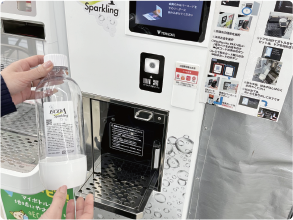Resource recycling initiatives for plastics
Start of bottle-to-bottle, horizontal recycling of PET bottles
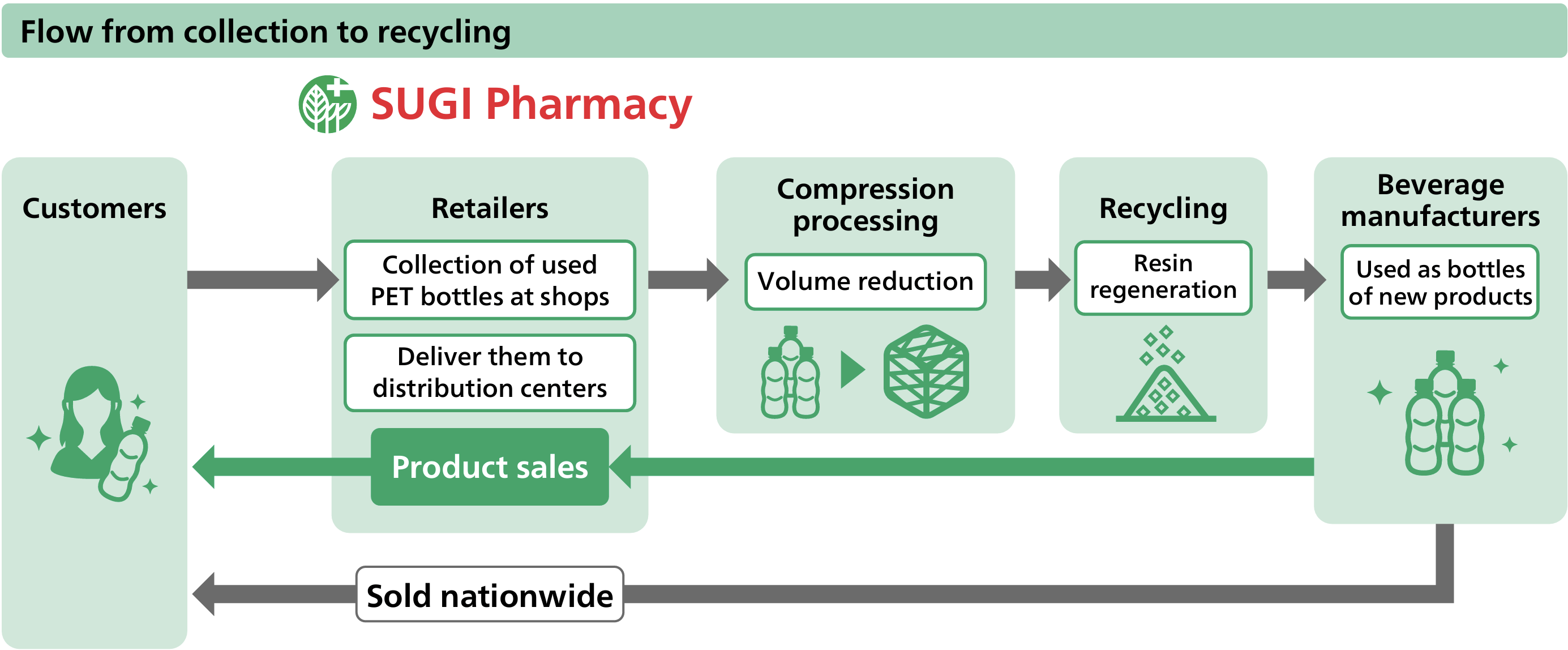
The SUGI Pharmacy Group, in collaboration with its supply chain companies, started a closed-loop,
bottle-to-bottle recycling initiative in which used PET bottles are collected and recycled as new
PET bottles. In FY 2024, we installed Bottle Squashes in a total of 142 stores, and we have
continued to increase installations since.
In this initiative, we are installing new recycling boxes in SUGI Pharmacy stores with the aim of
collecting high-quality used PET bottles that have had their labels and caps removed and have been
washed. Bottles collected at stores are transported to a SUGI Pharmacy distribution center by
trucks returning from delivering merchandise to SUGI Pharmacy stores. There, the bottles are
processed for volume reduction by a contracted compression processing company and, later, for
resin regeneration by a recycler. Then, our partner beverage manufacturers use the recycled PET
bottles as containers for their beverage products.
Going forward, we will work to improve the efficiency of the collection scheme and reduce the cost
of recycled PET resins by encouraging more companies in the supply chain to participate in the
collection process.
Introduction of Bottle Squashes in stores and at the SUGI Pharmacy Group head office (Obu City, Aichi Prefecture)
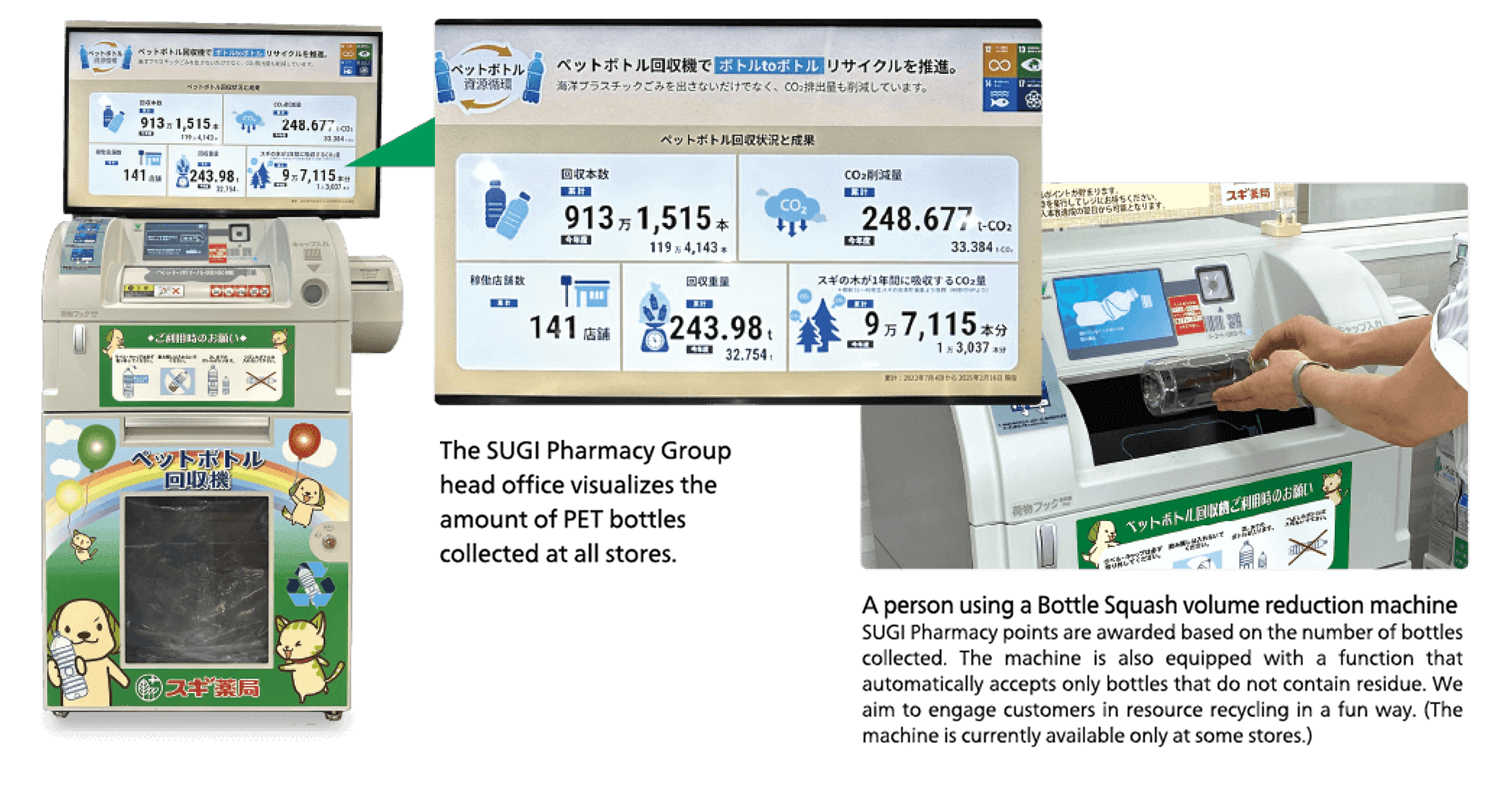
Recycling resources in coordination with government agencies
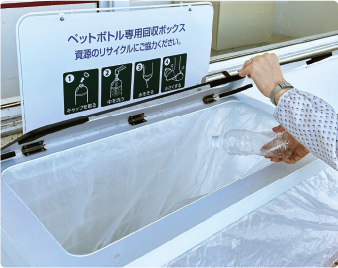
Collecting PET bottles in coordination with Shizuoka City
Participation in the verification tests for a medicine sheet recycling program
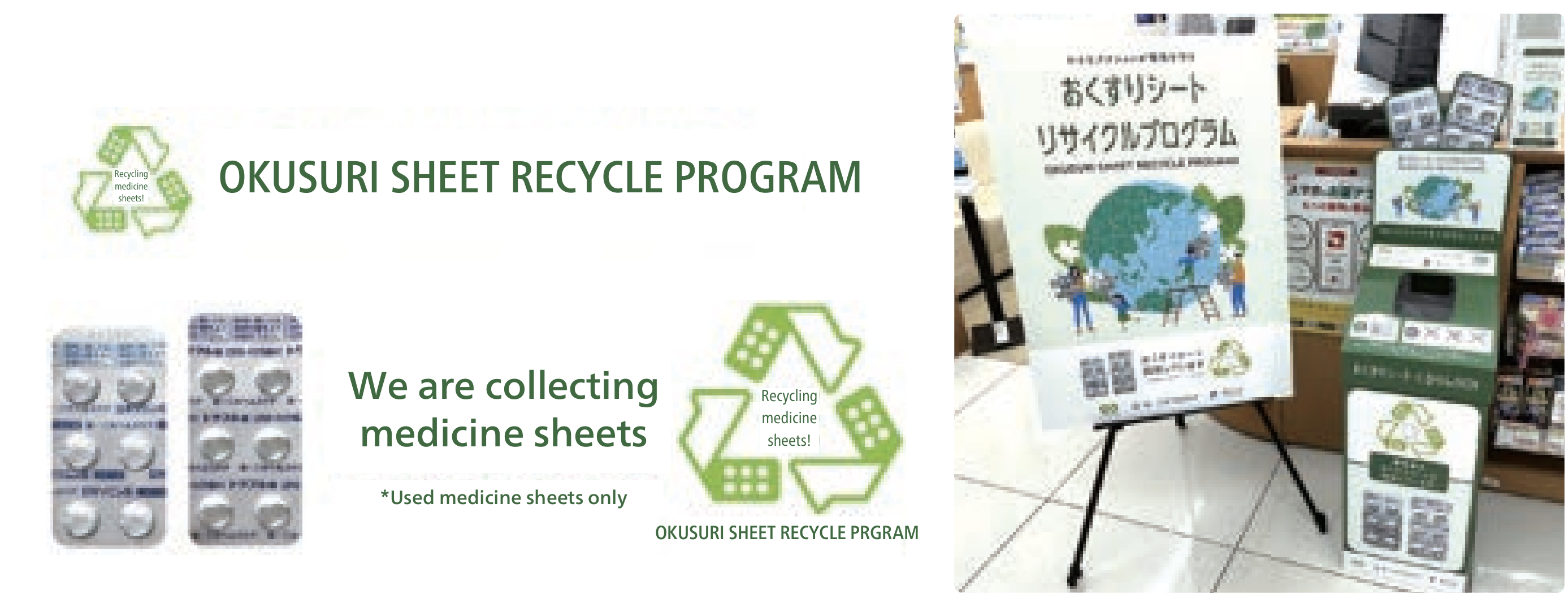
Stores of the SUGI Pharmacy Group participate as collection sites in Japan’s first
consumer-participation-based used “OKUSURI SHEET” (PTP sheet) recycling program, which was organized
by Daiichi Sankyo Healthcare Co., Ltd. and launched in Yokohama City in collaboration with TerraCycle
Japan LLC.
In Japan, approximately tens of thousands of tons of PTP sheets are produced each year. They are
indispensable packaging materials for pharmaceuticals, as reducing their consumption is difficult.
Their use is expected to continue increasing as the population ages. However, few consumers recognize
them as recyclable, so the collection volume is small. Therefore, unlike with PET bottles, there are
no established recycling mechanisms for PTP sheets.
By serving as collection sites for PTP sheets of prescription drugs and over-the-counter (OTC)
pharmaceuticals sold and/or used by the SUGI Pharmacy Group, we will raise awareness among customers
and patients that these materials are recyclable and help establish a recycling mechanism.
Participation in a sponge recycling program
We participate in a sponge recycling program in collaboration with 3M Japan Limited and TerraCycle Japan LLC. Our stores will serve as collection sites.
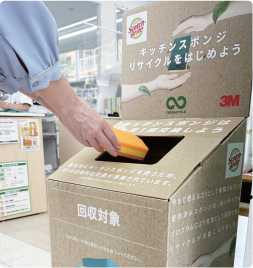
Reducing the use of plastic
We continue to charge for plastic checkout bags to reduce their use.
No. and weight of used checkout bags
| FY 2020 | FY 2021 | FY 2022 | FY 2023 | FY 2024 | |
|---|---|---|---|---|---|
| No. of used bags (unit: 1 million bags) |
144 | 43 | 65 | 102 | 120 |
| Weight of used bags (unit: ton) |
1,100 | 328 | 507 | 800 | 960 |

Strengthening resource recycling initiatives for clothing and textile goods
Recycling of used uniforms as display fixtures
The SUGI Pharmacy Group has introduced PANEKOⓇ, a sustainable board made from discarded clothing. Used uniforms of store employees are collected and recycled as store fixtures made of PANEKOⓇ.
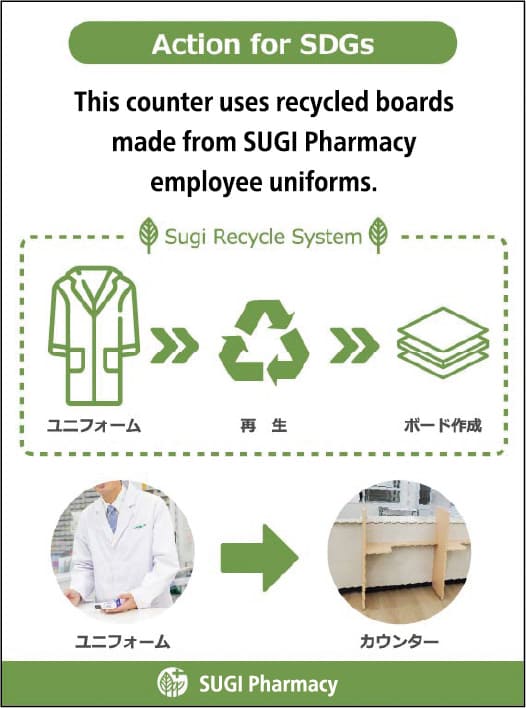
Role as a collection base for textiles and clothing
Clothing items are collected at our stores in Okazaki City and Chiryu City, Aichi Prefecture.
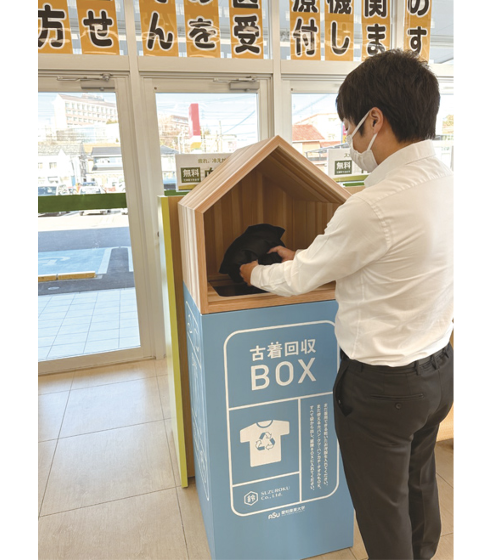
Strengthening resource recycling initiatives for food (food loss reduction)
Promoting temaedori (taking from the one in front)
We have been implementing the “temaedori” (taking from the one in front) initiative together
with the government agencies concerned and JACDS member companies. This initiative is aimed at
reducing food waste by encouraging customers who plan to eat food right away to choose from and
purchase products in the front.
At the same time, we will promote the initiative to reduce the food-loss-and-waste ratio through
the promotion of selling out by revising food disposal standards, the reduction of excess
inventory by revising inventory standards for bread, and the optimization of inventory by
introducing automatic order placement for food.
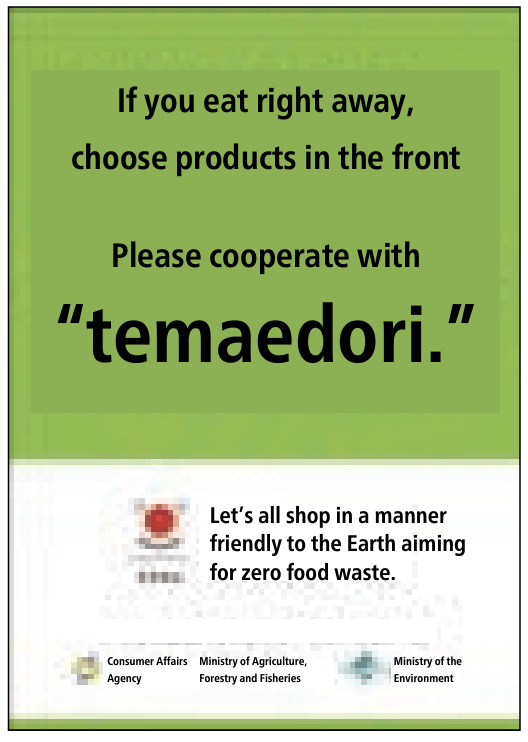
Strengthening the promotion of selling out of foods whose best-before date is approaching
By introducing a closeout sticker issuing machine, we have increased productivity by reducing the burden of in-store work to sell out of foods whose best-before date is approaching. Through this effort, we have strengthened the promotion of selling out of foods whose best-before date is approaching.
Donation to food banks
We have started the donation, to food banks, of foods that cannot be sold due to an approaching best-before date or damaged packaging although it is safe to eat them. As these foods are provided free of charge to facilities, groups, and needy households that need them, we can reduce food loss and waste while solving social issues.
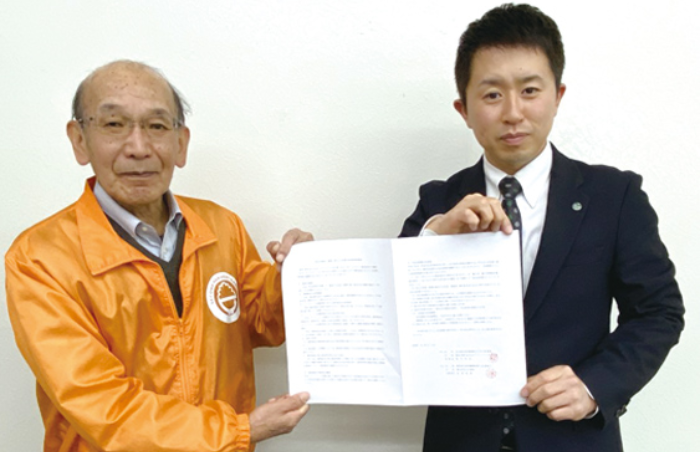
Start of the donation of rice to Second Harvest Nagoya
Running a food drive
We ran a food drive at various events that we held in coordination with government agencies.
Going forward, we will run a food drive not only at events, but also at our stores to expand
our activities so that we can work with local residents to address issues.
The SUGI Pharmacy Group will strengthen its efforts to resolve the social issues of food waste
and poverty.
*A food drive means an activity in which people bring surplus food from their homes and donate it to local welfare organizations and facilities, food banks, and the like.
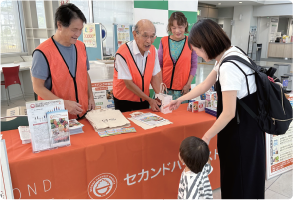
Reducing marine plastic waste by installing water stations
We have endorsed the “work together to install water stations” challenge of the Sutehaji Project, which will be carried out by co-creation partners of TEAM EXPO 2025 (Expo 2025 Osaka, Kansai), and participated in the project as a co-creation partner. Through the installation of water stations, we aim to contribute to the reduction of PET bottle use and marine plastic waste
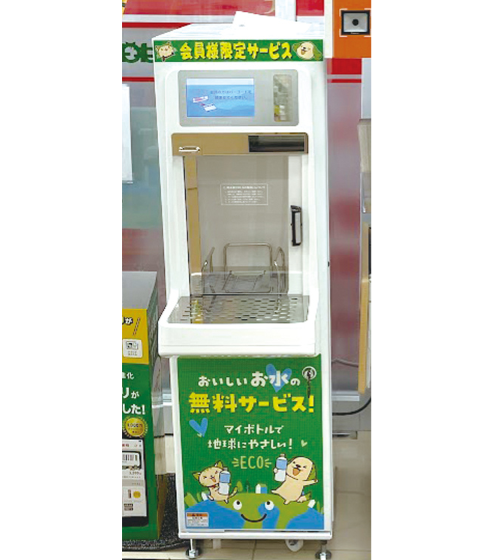
Reducing marine plastic waste by installing carbonated water vending machines
Through the installation of carbonated water vending machines, we will contribute to the reduction of PET bottle use and marine plastic waste.
